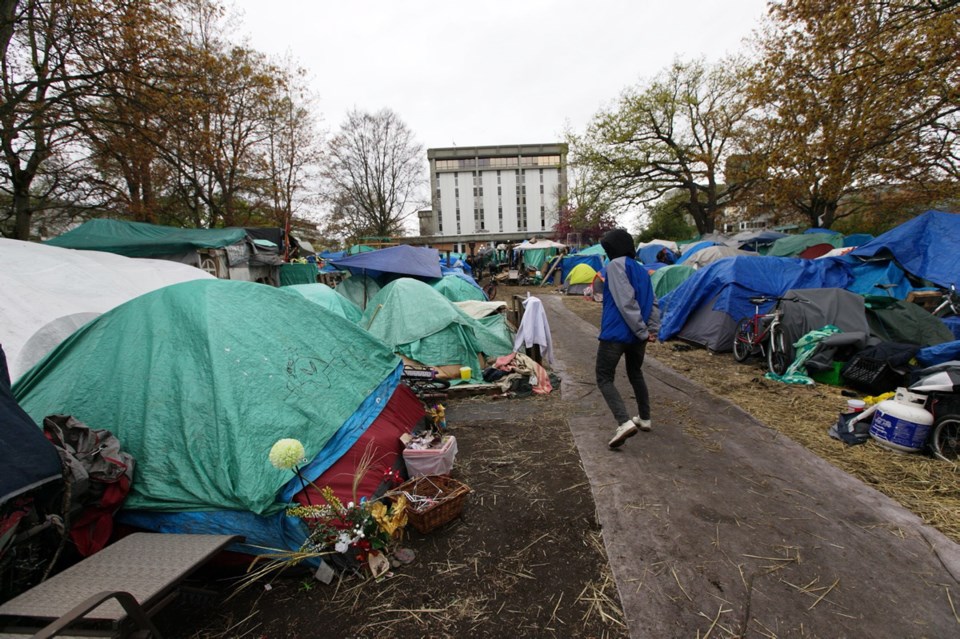The provincial government spent $3 million in legal fees and site cleanup after homeless people camped on the Victoria courthouse lawn last year.
The Ministry of Citizens’ Services says $2.2 million was spent to manage, clean up and remediate the tent city site, which was closed a year ago. A confidential document leaked to the Times Colonist this week says that close to $800,000 was spent on legal costs.
The Ministry of Attorney General refused to confirm the legal costs, citing solicitor-client privilege. Previous freedom-of-information requests for the legal bill have been denied.
In its efforts to close the camp, the government sought a court injuction to remove the campers. The injunction was awarded after five months, when alternative housing had been provided.
A breakdown of court costs related to the encampment, apparently provided by someone who works for the provincial government, cites total legal services costs of $729,277.50.
Fees outlined include $541,894 for government lawyers and $190,134 for outside counsel. Other costs include $4,680 for experts, $25,945 for document management, $13,818 for mediation and close to $3,000 for transcripts and travel.
The $44,445.97 the Crown paid the defendants to cover filing costs was not included.
“Going to court is a costly choice and you never know what’s going to happen — it’s out of your hands,” said Scott Hennig of the Canadian Taxpayers Federation. “I think the lesson for government is, don’t drag your feet when issues like this come up, and look at alternatives outside of court.”
The Ministry of Citizens’ Services said $1.7 million was spent on garbage cleanup, water and hydro, fencing and security; $501,000 on remediating the site; $190,000 on security after the camp closed; $300,000 on landscaping; $68,000 on the new playground (which received $230,000 from donors) and additional funds on social supports.
While the camp was active, the City of Victoria approved $113,000 for extra policing.
As a result of the tent city, B.C. Housing says it spent $50 million on temporary shelters, permanent housing, outreach and management.
The encampment started in the fall of 2015 when a small group of homeless people learned the provincially owned property was not subject to city bylaws preventing daytime camping in parks.
The site became part of a campaign demanding more low-income housing in Victoria, which for several years has had a rental occupancy rate of less than one per cent. Homeless shelters also operate beyond capacity.
In February 2016, the province sought an injunction to evict the campers, based on safety concerns. B.C. Supreme Court Chief Justice Christopher Hinkson rejected the application, saying the homeless had no safer place to go. That spurred the government to find housing for more than 100 people at the camp.
The purchase of three buildings — the former Central Care Home on Johnson Street, Mount Edwards Court on Vancouver Street and the former Super 8 hotel on Douglas Street — resulted in more than 250 new permanent supportive-housing units.
With housing available, the province returned to court and was granted an injunction to close the tent city in August 2016.
“While we’re happy more housing came out of the litigation, we tried to … work something out with government, but we couldn’t get there,” said Stephen Portman from the Together Against Poverty Society, which supported the campers as defendants and helped secure pro-bono legal representation for them.
“The courts have become a blunt instrument for the development of social housing … which is not how things should be done.”
Portman said B.C. Housing should have met with the homeless campers to find out which housing options would best suit their complex needs and plan from there.
“We could have avoided the court costs and we could have got better housing,” he said.
DJ Larkin from Pivot Legal Society in Vancouver said her organization has helped defend homeless people in camps for years.
“The result is expensive litigation and the recognition that homeless do have rights to shelter and safety, but cities can’t often provide that,” she said.
Larkin said Maple Ridge recently decided against court action to deal with homeless campers, and to look to the province for housing funding instead.
“We are decades behind in social housing,” said Larkin, adding that Housing Minister Selina Robinson has a mandate to create 114,000 units of affordable and social housing, amend the Residential Tenancy Act to prevent unnecessary evictions and develop an action plan for homelessness.



